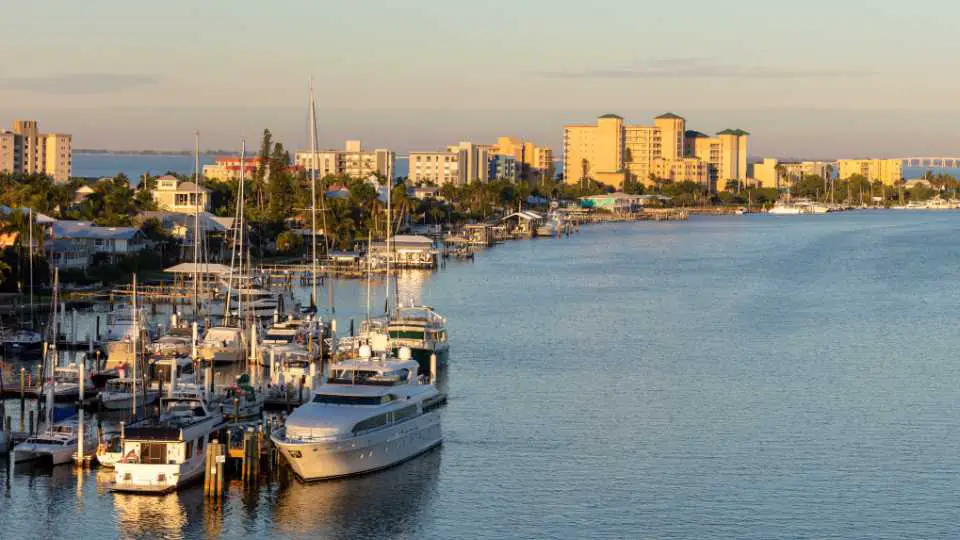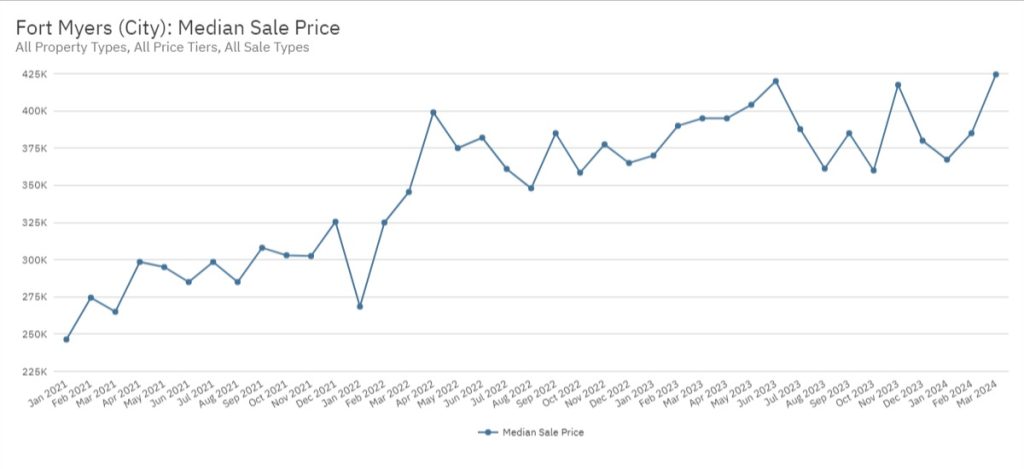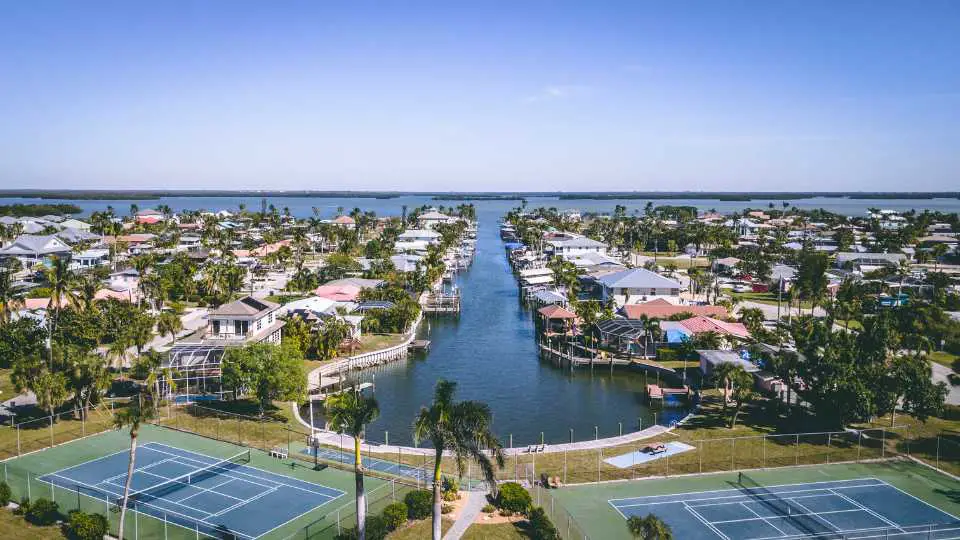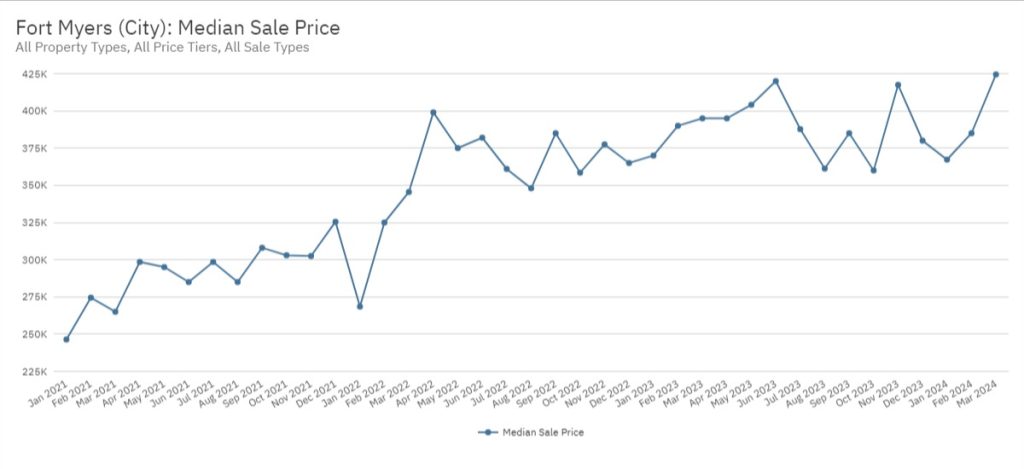
Fort Myers, Florida, nestled along the Caloosahatchee River, exudes charm with its historic downtown and boasts a vibrant atmosphere that draws both tourists and potential residents. As the city experiences growth, newcomers are often attracted to its small-town feel combined with the conveniences of a more populous setting. The city’s atmosphere is enhanced by the presence of new restaurants, shops, and a downtown district that’s continually expanding.
The cost of living in Fort Myers is relatively lower than many of its coastal neighbors, making it an appealing choice for many. Housing costs, utilities, and general expenses are more affordable here compared to areas like Miami-Dade County. This affordability, when paired with Florida’s lack of an income tax, positions Fort Myers as a practical location for individuals and families looking to relocate.
However, Fort Myers is not without its challenges. The influx of tourists can lead to heavier traffic during peak seasons. Still, those who reside here benefit from a laid-back lifestyle and a sense of community that is hard to find in larger cities. With a median age in the early 40s and a variety of housing options from single-family homes to condos, Fort Myers presents an inviting mix of life stages and living arrangements suitable for many.
Getting to Know Fort Myers
Fort Myers, Florida, is a city rich in history and culture, known for its inviting community and pleasant climate. Situated on the Gulf Coast, the city offers residents and visitors a blend of historic charm and modern living.
History and Culture
Fort Myers has a storied past that dates back to its founding by Colonel Abraham Myers in 1850. The city played a role in the Seminole Wars and later became a strategic base during the American Civil War. In the 20th century, it gained fame as the winter home of Thomas Edison and Henry Ford, whose estates now serve as museums that celebrate their contributions to American innovation.
Key Cultural Aspects:
- Historic Downtown: Maintains a vibrant atmosphere with restored buildings.
- Edison and Ford Winter Estates: National Register Historic Site and museum.
- Art and Music Festivals: Regular cultural events that attract talent and tourists.
Population and Community
Fort Myers’s population is diverse and growing due to its affordability and quality of life. The community is characterized by a mix of young professionals, families, and retirees. The city fosters a small-town feel while providing the amenities and opportunities of a larger urban area.
Demographics at a Glance:
- Population (as of 2024): Approximately 87,000 residents.
- Community Spirit: Close-knit neighborhoods and active civic groups.
Geography and Climate
Located on the southwest coast of Florida, Fort Myers is the gateway to the Gulf Coast, providing scenic views and access to beautiful beaches. The city features a subtropical climate with mild, dry winters and hot, wet summers — ideal for year-round outdoor activities.
Climate Details:
- Average Temperatures: Range from 75°F in winters to 92°F in summers.
- Hurricane Season: Awareness and preparedness are critical from June to November.
Fort Myers’s geography and climate have made it a favorable destination for those seeking a balance between urban and beachside living.

Living in Fort Myers
Fort Myers offers a relaxed yet vibrant lifestyle with a developing downtown area. Residents enjoy a balance of small-town community appeal and the amenities of a growing city.
Housing Market
The real estate market in Fort Myers features a variety of housing options, accommodating a range of preferences and budgets. The average home price in Fort Myers is around $419,900, which gives potential homeowners a chance to find properties that fit their lifestyle. The housing stock includes waterfront homes, condos, townhouses, and single-family residences.
Cost of Living
Individuals considering a move to Fort Myers will find the cost of living to be reasonably affordable in comparison to larger metropolitan areas like Miami-Dade County. For instance:
- Median Rent: Expected to be in the vicinity of the market average
- Energy Bill: Approximately $182.30/month
- Phone Bill: Estimated at $196.12/month
- The overall cost of living is about 10% lower than in some neighboring counties, making Fort Myers a financially feasible choice for many.
Education Opportunities
Schools in Fort Myers accommodate a spectrum of educational needs with public, private, and charter schools. The area places a strong emphasis on education with a variety of programs designed to cater to student success. Besides K-12 options, higher education opportunities are available through institutions such as Florida Gulf Coast University and Fort Myers Technical College.

Employment and Economy
Fort Myers, Florida, has shown resilience and growth in its job market, which pairs with a rising median household income. The local economy presents a competitive landscape for job seekers across various industries.
Job Market
The job market in Cape Coral-Fort Myers is dynamic, with employment opportunities expanding in sync with the area’s economic growth. Employment sectors leading this growth include tourism, healthcare, and retail, contributing to the area’s employment prospects. The Bureau of Labor Statistics indicates steady employment growth in these sectors as of early 2024.
Fort Myers has shown a capacity to attract new businesses, further energizing the job market. This makes it competitive for job seekers, encouraging a workforce that is skilled and diverse.
Income and Expenses
When it comes to household income, Fort Myers has seen a positive trend. Data from 2021 indicated a median household income of $51,682, marking an increase from the previous year. This rise in income is indicative of a healthy and strengthening local economy.
- Housing Prices: While the influx of new residents and economic vitality may pressure the housing market, housing prices have remained affordable compared to other Florida metro areas.
- Expenses: The cost of living in Fort Myers remains competitive, particularly when considering housing, utilities, and groceries against the backdrop of the overall Florida state averages.
The balance between income and expenses is crucial for the individuals and families considering relocation, and Fort Myers offers an advantageous economic environment.
Things to Do
Fort Myers, Florida, is brimming with activities, from pristine beaches and lush parks to a thriving arts scene and diverse culinary offerings. Visitors and residents can take advantage of outdoor fun, cultural entertainment, and shopping and dining experiences that cater to a variety of tastes and preferences.
Outdoor Activities
Fort Myers boasts an array of beaches perfect for sunbathing, swimming, and water sports. Fort Myers Beach is a popular choice for its soft sand and vibrant atmosphere. For a more secluded experience, Lovers Key State Park offers quiet recreation along with opportunities for wildlife spotting and hiking.
- Beaches: Fort Myers Beach, Bowditch Point Park
- Parks: Lakes Park, Matanzas Pass Preserve
- Events: Explore the outdoors with seasonal festivals and local outdoor events.
Parks serve as a serene escape, with destinations like Lakes Park featuring walking trails, gardens, and bird-watching opportunities. Outdoor enthusiast can regularly find events and festivals celebrating Fort Myers’ natural beauty and outdoor lifestyle.
Arts and Entertainment
The cultural heartbeat of Fort Myers comes alive through its arts and entertainment offerings. The Barbara B. Mann Performing Arts Hall showcases renowned performances ranging from concerts to Broadway shows.
- Art Galleries: Frequent local galleries for a glimpse into the region’s creative pulse.
- Museums: Gain insight into history and science at area museums.
- Events: Annual art festivals and cultural events pepper the city calendar.
In addition to performance arts, art galleries and museums like the Edison and Ford Winter Estates add a historical and educational dimension to the art scene.
Shopping and Dining
Retail therapy is an essential part of the Fort Myers experience, with a host of shopping options from boutique stores to malls. The Fort Myers River District is a hub for both retail enthusiasts and culinary adventurers.
- Restaurants: Offer a diverse array of cuisines with fresh, local ingredients.
- Shopping: Encounter an eclectic mix of shops in the Fort Myers River District.
Dining in Fort Myers is a treat, with restaurants serving everything from fresh seafood to international dishes. Frequent events and festivals often include food fairs and farmer’s markets, further highlighting the region’s dining scene.

Transportation and Accessibility
In Fort Myers, Florida, residents and visitors have various transportation options that cater to a range of accessibility needs, ensuring that the city’s natural beauty and urban amenities remain accessible to all.
Public Transport
The public transportation system in Fort Myers is managed by LeeTran, which operates a network of wheelchair-accessible city buses. This service allows residents and visitors to navigate around the city and reach various destinations. However, it’s important to note that, due to Lee County’s expansive area and the sometimes limited bus schedules, relying exclusively on public transport can be challenging, particularly for tourists looking to explore widely.
Local Commutes
For those preferring personal transportation, the city presents several options:
- Taxi Services: Conventional and accessible taxi services are available, with some companies offering lift-equipped vehicles for passengers with mobility impairments.
- Rental Cars: Rental agencies accommodate visitors looking to manage their own commutes throughout the city and to nearby attractions, with accessible options upon request.
- Beach Accessibility: Mobility on the beaches is facilitated through the provision of beach wheelchairs and ADA accessible features, reducing barriers for those wishing to enjoy the coastal areas.
Traffic within Fort Myers is typically moderate, but like any growing city, rush hours can lead to increased congestion. Planning commutes accordingly can help residents and visitors avoid peak traffic times.
Healthcare and Wellness
Fort Myers, Florida, is equipped with a robust healthcare system alongside opportunities for holistic wellness, ensuring residents have access to both traditional and alternative health services.
Healthcare Services
Lee Health is a prominent player in Fort Myers’ healthcare, offering a comprehensive range of medical services. Residents can access several hospitals and specialty care centers, catering to diverse health needs.
- Hospitals within Lee Health:
- Cape Coral Hospital
- Gulf Coast Medical Center
- HealthPark Medical Center
- Lee Memorial Hospital
Patients benefit from Lee Health’s specialized care departments, including cardiology, orthopedics, neurology, and more. The healthcare provider is known for its integration of advanced medical technologies and patient-centered care.
Healthy Living
Fort Myers promotes healthy living through a variety of wellness centers and assisted living communities with a focus on holistic care.
- Wellness Centers:
- AHA! A Holistic Approach
- Chrysallis Wellness Center
These centers emphasize the importance of nurturing one’s overall well-being, often including services such as yoga, massage therapy, and nutritional counseling. Assisted living facilities, such as Merrill Gardens at Barkley Place, provide supportive health services and are integral to the senior community, featuring amenities that encourage an active and healthy lifestyle.
Real Estate Insights
In Fort Myers, the real estate market presents a mix of competitive housing prices and opportunities for both buyers and renters. A careful examination of neighborhoods and market trends is essential for making informed decisions.
Buying and Renting
Buying: Fort Myers has experienced a slight increase in median home prices, reflecting a somewhat competitive market. As of the previous year, the median sale price of a home was approximately $398K, marking a 2.2% increase. In terms of time on the market, homes typically receive an offer within 59 days.
Renting: Renters can expect varied prices depending on the neighborhood but can find options aligned with Fort Myers’ cost of living. Recent data suggest a median rent, providing a benchmark for those looking to settle in the city.
Neighborhoods and Development
Edison Park: Located south of downtown, this neighborhood boasts historic charm with its Edison Park Historic District and lush greenery. Its residential appeal is complemented by the famous Edison & Ford Winter Estates.
| Neighborhood Name | Development Highlights |
|---|---|
| Edison Park | Historic district, Edison & Ford Winter Estates |
Housing Market Trends: Prospective residents will notice Fort Myers’ housing market to be accessible, with the cost of living approximately 4% below the national average. For professionals, families, or retirees, the city’s affordability and the quality of life in developing areas like the downtown district make it an attractive locale.

Considering Relocation
When considering relocating to Fort Myers, Florida, individuals should weigh the advantages and drawbacks of the area, in addition to seeking advice to ease their transition. This section provides clear insights on the pros and cons of moving to Fort Myers, as well as useful tips for those who decide to make this city their new home.
Pros and Cons
Pros:
- Affordability: The cost of living in Fort Myers is 4% below the national average and 6% lower than the Florida state average.
- Housing Market: The average home price in Fort Myers stands over $400,000, with a homeownership rate of 48.2%.
- Community: Residents often enjoy a laid-back lifestyle in a tight-knit community.
Cons:
- Employment: The unemployment rate here is at 5.3% which may affect job opportunities.
- Traffic: Fort Myers can experience congestion, especially during peak hours and tourist seasons.
Tips for New Residents
- Understanding Housing Options:
- Research the local housing market thoroughly to find suitable options within your budget.
- Preparing for Traffic:
- Plan commutes outside of peak traffic times, typically 7–9 a.m. and 4–7 p.m., to avoid congestion.
Are you interested in owning a home in Florida?
If the allure of sun-kissed beaches, vibrant communities, and year-round warmth speaks to your heart, owning a home in Florida might just be your next great adventure!
To assist our audience with buying or selling a vacation property, Endless Summer has affiliated with Quantum Realty Advisors, Inc. (“Quantum”) which is a licensed Florida real estate company that has been in business since 1998. Whether you’re dreaming of a cozy beachfront bungalow, a sprawling estate nestled against the backdrop of palm trees, or a chic urban condo in the heart of a bustling city, Quantum will help make that dream a reality.
From less than $500,000 to more than $5 million, the Quantum team will be happy to assist with your vacation home buying process and can be reached at 561.584.8555.
Quantum Realty Advisors, Inc.
4440 PGA Boulevard, Suite 308 | Palm Beach Gardens, FL 33410
561.584.8555

Quantum’s experienced real estate advisors will take the time to discuss exactly what your are looking for in a vacation home as well your what will fit into you budget. And when you are ready to begin, they will be with you every step of the way. Click here to learn more about Quantum.

